- Home
- /
- News Updates
- /
- High Courts Weekly Round-Up
High Courts Weekly Round-Up
Arabhi Anandan
10 Feb 2020 10:09 AM IST
Allahabad High Court Allahabad HC Grants Bail To Swami Chinmayanand In Sexual Exploitation Case Of Law Student [Swami Chinmayanand Alias Krishna Pal Singh v. State of U.P.] The Allahabad High Court granted bail to former Union Minister and BJP leader Swami Chinmayanand, who has been accused of sexually exploiting a 23 years old law student. The order was passed by...
Next Story



